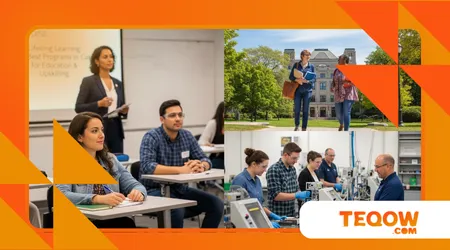Lifelong Learning: Best Programs in Canada for Adult Education & Upskilling

Lifelong Learning has fundamentally shifted from an abstract ideal to an urgent economic necessity for every working Canadian in 2025.
The rapid pace of technological disruption, particularly with advanced AI integration, dictates that continuous upskilling is the only reliable path to career stability and growth.
This column explores Canada’s leading educational pathways designed specifically for adult learners seeking rapid, relevant skill acquisition.
Choosing the right program is a strategic investment in your future earning potential and professional adaptability.
Canada’s top universities and colleges have responded aggressively to this demand, creating flexible, high-impact offerings tailored to the schedules of busy professionals.
We highlight the best institutions providing verifiable credentials for the modern job market.
Why is Canadian Higher Education Pivoting to Micro-credentials?
The shift towards short-form credentials reflects a crucial recognition that traditional, multi-year degrees are often too slow to meet industry’s real-time skill gaps.
Micro-credentials offer a fast, focused pathway to acquire and validate specific, in-demand competencies. This model is perfectly suited to the time constraints of the modern working adult.
The Rise of Stackable Credentials
Many leading Canadian institutions now offer “stackable” micro-credentials, allowing learners to build toward a larger certificate or diploma over time, one focused module at a time.
This approach significantly de-risks the commitment for working professionals, allowing them to test the waters before dedicating to a full program.
Seneca Polytechnic in Toronto, for example, offers stackable micro-credentials in areas like Cybersecurity Analyst and UX Writing.
This structure allows for a customized learning journey, treating education more like a personalized, modular tool kit rather than a rigid structure.
Imagine adding a new, verifiable skill like “AI Workplace Essentials” to your resume in under three months; this immediate, tangible return on investment is what makes this model so attractive.
The value of this focused, rapid skill acquisition cannot be overstated in today’s dynamic labor market.
++ Comparing K-12 Education Across Provinces: What’s Different Between Ontario, Quebec & Alberta
Focused, Industry-Driven Content
The content within these programs is rigorously developed in partnership with industry leaders, ensuring the skills taught directly match current employer needs.
Unlike theoretical academic courses, these micro-credentials deliver practical, job-ready proficiencies. This direct link to the workforce enhances the immediate utility of Lifelong Learning.
The Future Skills Centre (FSC) notes that two-thirds of employers are actively interested in competency-based and accredited micro-credentials.
This statistic proves that employers trust these new credentials as reliable indicators of practical skill mastery.
This collaboration ensures that adult learners are spending their time and money on skills that matter immediately.

Which University Continuing Education Programs Offer the Best Flexibility?
Canada’s major universities have become powerhouses for adult education, providing the academic rigor of a university with the flexibility busy professionals require.
Their continuing education (CE) departments are the engines driving sophisticated Lifelong Learning opportunities.
Also read: Scholarships & Grants Every Student in Canada Should Explore
University of Toronto’s OISE Continuing & Professional Learning
The University of Toronto’s Ontario Institute for Studies in Education (OISE) offers an excellent Certificate in Adult Learning and Development, which can be completed fully online within one to two years.
Their courses focus on instructional design and needs analysis, skills critical for leadership and training roles in any sector. OISE utilizes its world-class research to inform practical, highly applicable workplace contexts.
This commitment to flexible, high-quality instruction is clearly resonating across the country.
According to a May 2025 survey by the Canadian Association for University Continuing Education (CAUCE), continuing education enrollment at Canadian universities has grown by a robust 16.1% since 2022.
This surge reflects the strong demand for flexible, credible upskilling options.
Read more: Online Learning & EdTech in Canada: Platforms Changing How We Study
Mount Saint Vincent University’s Lifelong Learning Focus
Mount Saint Vincent University (MSVU) in Halifax offers specialized graduate programs, including a Master of Education in Lifelong Learning.
This program is designed for those who wish to become leaders in adult education, focusing on curriculum development and learning policy.
MSVU’s focus highlights the institutional commitment to viewing adult education as a distinct, specialized academic discipline.
Their program’s emphasis on the unique characteristics and diverse needs of adult learners ensures graduates are highly effective facilitators of change.
This degree prepares professionals for senior roles in corporate training, government policy, and educational administration, solidifying the professionalization of the Lifelong Learning sector.
This focus provides a deep-dive into pedagogical theory tailored for non-traditional students.
How Do Colleges and Polytechnics Deliver Immediate Career Upskilling?

Canada’s college and polytechnic systems are uniquely positioned to deliver highly practical, career-focused adult education due to their strong ties with local industries.
These institutions focus on applied learning, making them essential hubs for Lifelong Learning aimed at career transition or advancement.
George Brown College Continuing Education
George Brown College in Toronto is a prime example, offering a vast array of Continuing Education programs in high-demand areas like IT, finance, and creative arts.
They boast incredible scheduling flexibility with evening, weekend, and online classes, ensuring accessibility for those juggling full-time work and family obligations.
They have repeatedly been recognized for their excellence in adult education, underscoring their quality.
Their program in Ontario Building Code, for instance, provides the specific, regulated knowledge required for professionals to advance their trade careers.
This focus on industry-specific certifications and practical skills ensures a direct line between the classroom and an immediate career advantage.
This institutional focus on applied skills is a cornerstone of Canada’s adult education landscape.
Conestoga College’s Adult Education Certificates
Conestoga College offers Certificates of Achievement in areas like Adult Education, specifically for professionals who need to transfer knowledge to others.
This program is ideal for subject matter experts who transition into training or teaching roles in their respective industries.
The curriculum focuses on practical methodologies, tools, and techniques for effective knowledge transfer.
This addresses a critical need in the workforce: ensuring that highly skilled employees can effectively mentor and train the next generation.
It acknowledges that being an expert does not automatically mean one is a good teacher.
By focusing on pedagogy for adults, Conestoga provides skills with immediate, measurable value in any corporate or instructional setting, proving the utility of Lifelong Learning.
What is the Role of Government and Funding in Promoting Lifelong Learning?
The success of Canada’s Lifelong Learning ecosystem is significantly supported by government initiatives and funding mechanisms designed to make upskilling affordable and accessible.
Policy plays a vital role in removing financial barriers and promoting skill development across the entire workforce.
OSAP and Micro-credential Funding
In Ontario, the government has provided financial support through the Ontario Student Assistance Program (OSAP) for eligible students enrolling in over 1,900 different micro-credential programs.
This policy move acknowledges that short-term, career-focused training deserves the same financial support as longer degree programs.
This commitment is key to reducing the cost burden on adult learners.
This targeted funding ensures that individuals, regardless of their current financial status, have the opportunity to acquire critical new skills.
By recognizing micro-credentials as a legitimate educational investment, the government is effectively accelerating the pace of workforce adaptation, directly combating the threat of skills obsolescence.
Provincial Skills Initiatives
Various provinces, including British Columbia, have developed Micro-Credential Frameworks to ensure consistency and quality across their public post-secondary institutions.
These frameworks ensure that micro-credentials are not simply proprietary certificates but verifiable, recognized competencies that employers can trust.
This standardization is crucial for ensuring the credibility of Lifelong Learning credentials.
The collective effort between government and post-secondary institutions acts as a powerful safety net for Canadian workers facing automation and market shifts.
The accessibility of high-quality, government-recognized training is analogous to a public utility essential infrastructure for a competitive, adaptive national economy.
Why shouldn’t education be treated as essential infrastructure for growth?
| Select Canadian Adult Education Programs (2025) | Institution Type | Target Skill Focus | Credential Type |
| Adult Learning & Development Certificate | University (U of T-OISE) | Instructional Design, Training & Evaluation | Certificate |
| Cybersecurity Analyst Stack | Polytechnic (Seneca) | Cloud Security, Incident Response, Network Security | Micro-credentials |
| E-commerce Management | College (George Brown) | Digital Marketing, Conversion Rate Optimization (CRO) | Continuing Ed Certificate |
| M.Ed. in Lifelong Learning | University (MSVU) | Adult Education Leadership, Curriculum Policy | Master’s Degree |
Source: Based on program offerings from Canadian post-secondary institutions, 2025.
The Canadian commitment to Lifelong Learning offers a diverse and highly credible landscape for adult learners in 2025.
From university-level graduate studies to highly practical college micro-credentials, the paths to upskilling are more accessible and flexible than ever before.
The record growth in continuing education enrollment (16.1% since 2022) confirms that Canadians are seizing these opportunities to future-proof their careers.
Now is the time to strategically assess your skill gaps and choose the Canadian program that will deliver the greatest return on your educational investment.
Share your own successful upskilling journey in the comments below!
Frequently Asked Questions
What is the primary benefit of a Micro-credential over a full certificate?
The primary benefit is speed and focus. Micro-credentials allow learners to acquire a single, specific, job-relevant skill in a matter of weeks, immediately applying the knowledge for career advancement or transition.
Is the quality of online adult education programs in Canada verified?
Yes, reputable programs offered by Canadian universities and colleges (like U of T or Seneca) are subject to rigorous accreditation and curriculum review, ensuring high academic standards and industry relevance.
Are there provincial subsidies available for all adult education programs?
Financial assistance varies by province and program type. Ontario’s OSAP funding extends to many micro-credentials, but learners should always verify eligibility for provincial grants or loans directly with the institution.
Who should pursue an M.Ed. in Lifelong Learning?
Professionals aiming for senior roles in training, organizational development, human resources, or those wishing to teach adult education at the post-secondary level should pursue this advanced degree.
